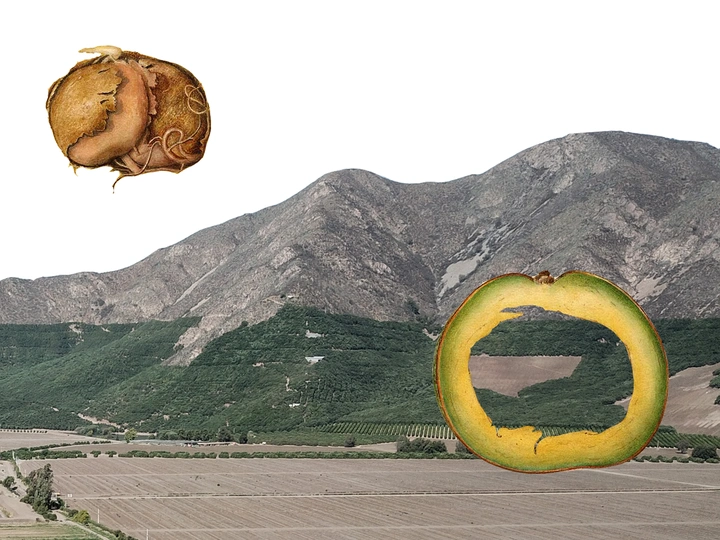Persea americana's Odyssey

Juan Brunetti, a Chilean spatial practitioner, is currently working as a project leader at Studio Céline Baumann in Basel, where a diverse array of projects is undertaken. These include creating gardens fostering interaction between humans and non-human beings, designing rules for reopening enclosed areas of the city formerly owned by the chemical industry, reflecting on the colonial past of house plants in Europe, speculating about the rights of plants, and creating installations that raise awareness of the undersoil. These works have been exhibited in venues such as the Vitra Design Museum and the Triennale Milano.
His personal work aims to traverse various scales, from the micro to the macro, while also bridging the gap between biographical journey and global issues. Delving into the intricate relationship between landscape and politics, he examines power dynamics between Europe and South America through a speculative research-by-design methodology.
Juan earned a six-year degree in Architecture from the Universidad Diego Portales in Santiago, Chile, and completed a master’s in Landscape Architecture at the Technical University of Dresden and the School of Agronomy at the University of Lisbon. Currently, he is collaborating as an external consultant, affiliated with the former, in the preparation of a seminar-excursion along the north coast of Portugal with Professor Ana Viader Soler. He is an alumnus of the DAAD program for young Latin American architects and has worked in research and teaching roles in both Chile and Germany.
In addition to his gained experience working in several studios in both Latin American and European landscape architecture and architecture, Juan has actively participated in various interdisciplinary endeavors, emphasizing experimental and practical actions. His contributions and collaborations include projects with Raumlabor, Plastique Fantastique, Associação Ensaios e Diálogos, among others.
The avocado boom has sparked a global frenzy, yet its origins reveal a narrative steeped in exploitation and environmental degradation. Born in Mesoamerica, the avocado found an unlikely home in Chile, where its cultivation burgeoned to meet the insatiable demand of Northern markets.
This research, stemming from personal experience of growing up in Chile during the 90s, delves into the shadowy underbelly of its consumption, tracing the journey of its seeds from South American soil to European tables. In doing so, it uncovers a web of colonial legacies and inequitable trade practices, where the luxury of avocado toast masks the stark realities of water scarcity and economic disparity in Chile. But what if the journey of the seeds wouldn't end in waste?
By unearthing these uncomfortable truths through a speculative approach, this project challenges the prevailing narrative of avocado consumption as a harmless indulgence. It forces us to confront the ethical implications of our consumer choices and interrogate the systems of power that perpetuate global inequality.
The EU's stringent plant passport and seed regulations provide a stark contrast to the unchecked flow of avocado seeds across continents: while Europe demands traceability, it seems to turn a blind eye to the ramifications of its obsession.
In tracing the seeds' path, this research serves as a poignant metaphor for the broader issues of migration and urges us to reimagine our relationship with food and territory on a planetary scale.
Furthermore, this research prompts us to reconsider our understanding of invasiveness. Rather than viewing some species solely through a lens of eradication, we can speculate on how local ecosystems incorporate them, blurring the binary dichotomy of "native" versus "introduced". This shift in perspective offers a more holistic approach to managing ecological systems, one that acknowledges the interconnectedness of species and embraces the resilience of nature.